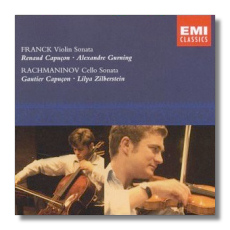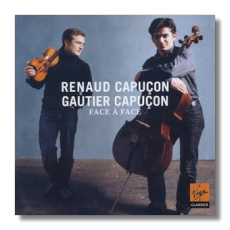
The Internet's Premier Classical Music Source
Related Links
- Latest Reviews
- More Reviews
-
By Composer
-
Collections
DVD & Blu-ray
Books
Concert Reviews
Articles/Interviews
Software
Audio
Search Amazon
Recommended Links
Site News
 CD Review
CD Review
Renaud & Gautier Capuçon Play

- César Franck: Violin Sonata
- Sergei Rachmaninoff: Cello Sonata
Renaud Capuçon, violin
Gautier Capuçon, cello
Alexandre Gurning, Lilya Zilberstein, piano
EMI Classics 57505 DDD 65:33


Face à Face - Duos For Violin & Cello
- Johan Halvorsen: Passacaille after Handel
- Zoltán Kodály: Duo
- Eric Tanguy: Sonata
- Ervin Schulhoff: Duo
- Ghys/Servais: Variations brillantes sur "God Save the King"
Renaud Capuçon, violin
Gautier Capuçon, cello
Virgin Classics 45576 DDD 69:36
Violinist Renaud Capuçon, born in 1976, studied with Isaac Stern, Augustin Dumay, and Isaac Stern. He began to gain international attention a few years ago. Last year I favorably reviewed his earlier Virgin Classics CD (45482) of popular French concertante works (Saint-Saëns's Havanaise, Ravel's Tzigane, etc.). Now here are two more CDs, and both also include performances by Renaud's younger brother, the cellist Gautier Capuçon. Born in 1981, Gautier is another young talent to watch. He won First Prize at the André Navarra Competition in Toulouse.
The EMI disc, on which the brothers play separately, was recorded as part of the "Martha Argerich Project" at the Lugano Festival in 2002. Now that Argerich is an elder stateswoman - practically a cult figure – she has the power, like cellist Pablo Casals before her, to inspire other musicians and to glorify the saintly art of chamber music outside of the major musical capitals. Like Casals, she doesn't deny herself the pleasure of actually performing at these gatherings. However, on this occasion (June 27, to be exact) she leaves the pianism to the youngsters, even though I know that she has at least the Franck sonata in her repertoire.
I know of no more freewheeling performances of the Franck and Rachmaninoff sonatas than the present ones. Polarized reactions are bound to result. The Franck, especially, is going to be "too much" for more hidebound reviewers, and anyone needing a nice, safe version of this sonata is advised to look elsewhere. However, for those who know this work well, and who believe that youth must be served, this wildly expressive and rhapsodic performance will be a treat, albeit a strongly flavored one. Renaud Capuçon's violin swoops, soars, gurgles, and keens in defiance of one's preconceived notions about taste. Emotional expression isn't sacrificed to the demands of classically beautiful tone. At the end of the second movement, his excitement starts to run a little faster than his bow, but this is a live performance, after all, and boys will be boys. Gurning, a name new to me, is a Belgian who was born in 1973. More than an accomplice, he is an equal partner in this ultra-spontaneous performance, and he apparently is not fazed by the considerable technical challenges Franck has posed.
Rachmaninov's early sonata has not impressed me in the past. It tends to stretch its musical materials to the thinness of a translucent membrane. Gautier Capuçon and Lilya Zilberstein finally have convinced me of the sonata's viability, handily outdoing the competition, which includes Yo-Yo Ma and Emanuel Ax. Capuçon and Zilberstein find the turns of phrase and the rhetorical elements that are characteristic of the older composer and emphasize them. The result is that this sonata sounds less like juvenilia than it usually does.
The excellent live recording includes noisy applause at the end of each work. The performers deserve it.
The brothers come together on Face à face, the Virgin Classics CD. The repertoire for violin and cello is not generous, and it is to their credit that the Capuçons avoid relying on arrangements. (Halvorsen's Passacaille isn't really an arrangement because it departs so drastically from the Handel harpsichord suite on which it is based.) Eric Tanguy's sonata was written for Renaud and Gautier, so they are enriching the repertoire already.
This is a studio recording, and not as unbuttoned as the live material from Lugano. Still, in the Halvorsen, the brothers make Jascha Heifetz and Gregor Piatigorsky (their most famous predecessors in this work) sound tame. There's more humor here than the old Russians were aware of, apparently. Kodály's daunting Duo has been famously recorded by the pair of János Starker and Joseph Gingold, among others. Again, the Capuçons impress with their impetuosity, and even with their hunger to make a distinctive mark on this repertoire. Schulhoff's Duo deserves to be known as well as Kodály's work in this genre. Written in 1925 (eleven years after the Kodály Duo), it is a melting pot of European classical music between the Wars, with a little jazz thrown in for good measure. Tanguy's concise Sonata employs a generalized modernism. When held next to the Schulhoff, it hardly seems that more than seventy-five years have gone by. Having said that, it's a fun, spiky piece, and a good workout for the performers.
Violinist Gidon Kremer recently included the Ghys/Servais variations on one of his CDs (the cellist was Marta Sudraba - Nonesuch 79657). They treated it like silly, pompous music – which it is. The Capuçons are more interested the work's demands on their virtuosity, and so their performance is more serious and more calculated to impress.
This is an interesting program, impressively played and recorded. French music writer André Tubeuf has penned one of his characteristically absurd booklet notes in praise of Renaud and Gautier Capuçon. In about 500 words, he manages to mention Hugo, the Bible, and Leibniz, and compares the brothers to knights of chivalry: "Renaud the Fair and Gautier the Dark." Ah, mon Dieu!
Copyright © 2003, Raymond Tuttle


















